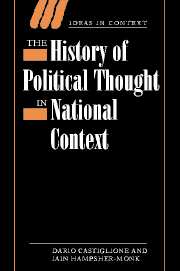Book contents
- Frontmatter
- Contents
- List of contributors
- Preface
- 1 Introduction The history of political thought and the national discourses of politics
- 2 The voice of the ‘Greeks’ in the conversation of mankind
- 3 History of political theory in the Federal Republic of Germany: strange death and slow recovery
- 4 A German version of the ‘linguistic turn’: Reinhart Koselleck and the history of political and social concepts (Begriffsgeschichte)
- 5 One hundred years of the history of political thought in Italy
- 6 Discordant voices: American histories of political thought
- 7 The professoriate of political thought in England since 1914: a tale of three chairs
- 8 The history of political thought and the political history of thought
- 9 The rise of, challenge to and prospects for a Collingwoodian approach to the history of political thought
- 10 Towards a philosophical history of the political
- 11 ‘Le retour des émigrés’? The study of the history of political ideas in contemporary France
- 12 National political cultures and regime changes in Eastern and Central Europe
- 13 The limits of the national paradigm in the study of political thought: the case of Karl Popper and Central European cosmopolitanism
- 14 Postscript. Disciplines, canons and publics: the history of ‘the history of political thought’ in comparative perspective
- Index
- IDEAS IN CONTEXT
5 - One hundred years of the history of political thought in Italy
Published online by Cambridge University Press: 23 September 2009
- Frontmatter
- Contents
- List of contributors
- Preface
- 1 Introduction The history of political thought and the national discourses of politics
- 2 The voice of the ‘Greeks’ in the conversation of mankind
- 3 History of political theory in the Federal Republic of Germany: strange death and slow recovery
- 4 A German version of the ‘linguistic turn’: Reinhart Koselleck and the history of political and social concepts (Begriffsgeschichte)
- 5 One hundred years of the history of political thought in Italy
- 6 Discordant voices: American histories of political thought
- 7 The professoriate of political thought in England since 1914: a tale of three chairs
- 8 The history of political thought and the political history of thought
- 9 The rise of, challenge to and prospects for a Collingwoodian approach to the history of political thought
- 10 Towards a philosophical history of the political
- 11 ‘Le retour des émigrés’? The study of the history of political ideas in contemporary France
- 12 National political cultures and regime changes in Eastern and Central Europe
- 13 The limits of the national paradigm in the study of political thought: the case of Karl Popper and Central European cosmopolitanism
- 14 Postscript. Disciplines, canons and publics: the history of ‘the history of political thought’ in comparative perspective
- Index
- IDEAS IN CONTEXT
Summary
A beginning: Gaetano Mosca
In 1896 – a crucial year in Italian history, with the failed attempt at colonialisation in Africa and the beginning of the long crisis of the end of the century – Gaetano Mosca published his masterpiece, Elementi di scienza politica (‘Aspects of Political Science’), gaining a chair at the University of Turin in the same year. Mosca was to teach constitutional law, but it was a teaching focused on historical and political rather than juridical studies. Mosca's attention to ideas and political institutions was, however, focused on legislation with an eye to empirical and historical matters. Along with constitutional law, philosophy of law was the other subject that, more than any, formed the basis for the discipline of political studies, shortly to be introduced in Italian universities. Numerous legal philosophers contributed to the history of political ideas in the twentieth century, from Gioele Solari to Giorgio Del Vecchio, and from Adolfo Ravà to Alessandro Levi.
The philosophy of law is a typical borderline subject, concerned as it is with both positive law and abstract speculation. It was the historical approach to the latter that provided an important starting point for the history of political doctrines. The neo-idealists, starting with Croce and Gentile, developed a complex philosophical historiography. Gentile's school practised a history of thought centred on ‘precursors’, using a unidirectional temporal axis leading from the present to the past. Philology, chronology, and biographical and background reconstruction were given little attention, while the focus was solely on the construction of ‘chains of concepts’: an ‘arrangement of connections of a super-temporal kind between the various links of these chains, for the exclusive clarification of logical connections’.
- Type
- Chapter
- Information
- The History of Political Thought in National Context , pp. 80 - 106Publisher: Cambridge University PressPrint publication year: 2001
- 1
- Cited by

